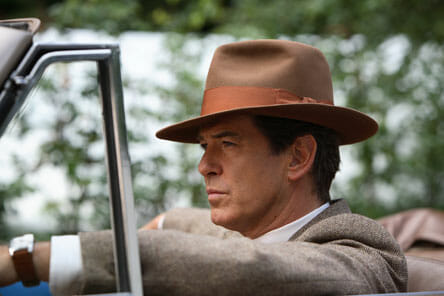
Release Date: March 7
Director: Ira Sachs
Writer: Ira Sachs and Oren Moverman
Cinematographer: Peter Derning
Starring: Pierce Brosnan, Chris Cooper, Patricia Clarkson, Rachel McAdams
Studio/Run Time: Sony Pictures Classics, 90 mins.
I spent the first hour of Ira Sachs’ new film, Married Life, trying to forget the opening credits. Not because I didn’t like them, but because they cast the shadow of a different kind of film over what came next. In the lively animated sequence, domestic paper dolls and twirling buds move in time to the buoyant voice of Doris Day who sings “I Can’t Give You Anything But Love.”
Set at the end of 1949, Married Life has the same look as the animated opening, the same crisp suits, colorful decor and perfect hair. An exquisite but weary Patricia Clarkson, an even-keel Chris Cooper, and a luminous, excessively-blonded Rachel McAdams look and interact like dolls clipped from the pages of Life magazine.
Cooper plays Harry, a married man having an affair who decides to murder his wife, played by Clarkson. Yet, despite this sinister plot, the film lacks the spunk, volume and whimsy of the animated opening, and the lassitude is noticeable immediately.
Oddly, Sachs sets us up to expect all manner of silliness or tears or thrills, but the film never approaches anything of the kind. It steps along at a slow, even pace while inviting comparisons to the intelligent weepies of Douglas Sirk, the suspense thrillers of Alfred Hitchcock, and the screwball comedies of Howard Hawks. (In Hawks’ Bringing Up Baby, Cary Grant and Katherine Hepburn also sing “I Can’t Give You Anything But Love,” but they harmonize with a fox terrier and a leopard, neither of which appears here.) The angst of Woody Allen? The philosophizing of Bergman? None of these is perfectly apt because of the way Sachs resists getting the audience worked up, neither moved, excited, amused, nor philosophically engaged.
The litmus paper in this curious experiment is the fourth cast member, Pierce Brosnan, Harry’s friend and the film’s narrator. His chiseled, mannequin-like face could fit into any of the above films. In this one, will he be the loathsome cad or the paper-thin hero? Or is he working in Fred MacMurray mode (the physical resemblance is uncanny), and if so, which one? The kind, fatherly MacMurray of a million films or the murderin’ piece o’ work from Double Indemnity?
The answer is, again, none of the above. Like the rest of the cast, Brosnan provides a well-tuned, nuanced portrait of normalcy, and nothing more. The film never fully embraces the genres it skirts, treating them instead like red herrings. Notably, Sachs co-wrote the film with Oren Moverman who also co-wrote Todd Hayes’ wildly, intentionally fragmented Bob Dylan film, I’m Not There.
In the end, Married Life is simply a series of mannered conversations that occasionally involve topics like poison and murder and love and divorce, but it applies them with such mild force that they seem secondary. It’s not unpleasant, except for the lingering question: secondary to what?
The closest comparison, if you subtract the fedoras, may be the films of Eric Rohmer, the French director of morality tales in which lovers simply converse. That would make two American Rohmer imitations in as many years, the first being Chris Rock’s ambitious, if not entirely successful, remake of Rohmer’s Chloe in the Afternoon, which he called I Think I Love My Wife.
And that sounds like something Harry might say: I think I love my wife. Therefore I shall poison her to spare her the pain of my affair. Married Life isn’t riotously funny or deeply probing or even particularly clever, and I doubt it’ll push any new thoughts about marriage into anyone’s noggin. But it’s elegant, unhurried, and, if you meet it half way, softly satisfying, not like any of the engaging films that it resembles but like the muffled clap of a velvet-covered ring box snapping shut.